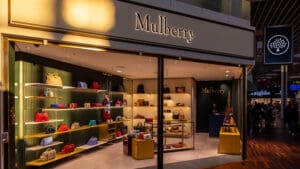
The head of British luxury brand Mulberry has called on the government to reinstate VAT-free shopping for international tourists, warning that the “unfair” tax burden is stifling investment and driving wealthy shoppers away from the UK.
Chief executive Andrea Baldo said the move would help revitalise Britain’s luxury and retail sectors — which have been hit hard by declining visitor spending since the 2021 abolition of the VAT rebate for overseas visitors — while boosting UK manufacturing and tourism revenues.
“Bringing back VAT-free shopping for tourists would be beneficial for the economy,” Baldo said. “You are competing with Paris and Rome — giving them an unfair advantage doesn’t make sense.”
According to data from Global Blue, spending by non-EU visitors in the UK remains at just 75% of pre-pandemic levels, compared with increases of 166% in Spain and 159% in France.
Mulberry estimates it has lost nearly £10 million in UK sales since the VAT-free shopping scheme was scrapped. Baldo said the loss of international footfall had been particularly visible in London:
“We’ve probably lost around a fifth of the traffic from international visitors. Our stores in Dublin and Amsterdam have almost doubled their business from travellers.”
Baldo said reinstating the VAT rebate would directly support UK manufacturing, with Mulberry’s Somerset production sites set to benefit from higher output if the policy were reversed.
The comments come as Chancellor Rachel Reeves faces growing pressure to stimulate growth after the Office for Budget Responsibility warned that weak productivity would cut Britain’s long-term economic potential, creating a £27 billion shortfall in fiscal forecasts.
Baldo acknowledged that reintroducing VAT-free shopping could prove politically contentious but argued that it was a matter of international competition, not privilege: “It’s not about giving tax relief to tourists — it’s about levelling the playing field. Our competitors in Europe already offer it.”
He added that removing the tax could provide an immediate boost to retail, hospitality and tourism — sectors critical to the UK’s economic recovery.
“Our business would invest more in UK production, and hotels, restaurants, and high street stores would benefit from the influx of international shoppers.”
Since joining Mulberry a year ago from Danish brand Ganni, Baldo has sought to stabilise the company following years of turbulence, including shareholder tensions between majority owner Ong Beng Seng’s Challice group and Mike Ashley’s Frasers Group, which holds a 37% stake.
Relations have since improved, with Frasers now backing Mulberry’s strategy and stocking its products in 15 Flannels stores, as well as Selfridges and John Lewis.
Mulberry, which raised £20 million in new funding this year, plans to open up to five new standalone stores across major UK cities including Birmingham and Liverpool, as it focuses on reconnecting with British consumers.
Baldo said the company was rebuilding its reputation as an accessible luxury brand while keeping its British heritage central. Sales at its Regent Street store are up 16% year-to-date, and the relaunch of the iconic Roxanne bag has drawn renewed interest from younger shoppers.
“We’ve got good momentum, although returning to profitability will take a minute,” Baldo said. “If we can leverage the love for the brand, we can grow the business.”
Baldo said Mulberry’s turnaround will succeed regardless of the government’s next fiscal steps, but warned that further tax increases could damage fragile consumer confidence.
He described the return of VAT-free shopping as “the gift under the Christmas tree” that Britain’s luxury, retail and hospitality sectors urgently need.
“We’re not asking for special treatment,” he added. “We’re asking for fairness — and the chance to compete on equal terms with the rest of Europe.”
Read more:
Mulberry chief urges Labour to scrap ‘unfair’ tourist tax as luxury sector reels from spending slump





